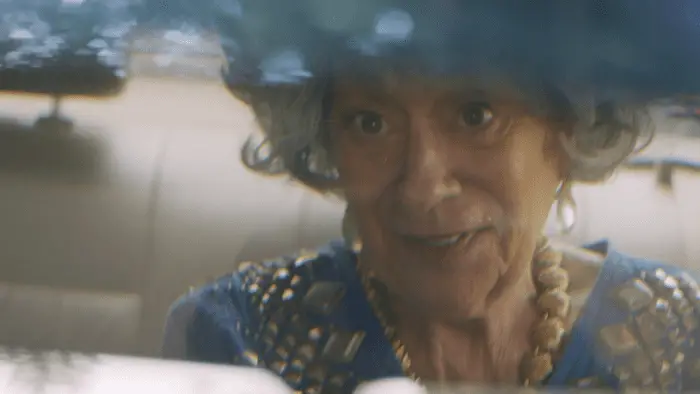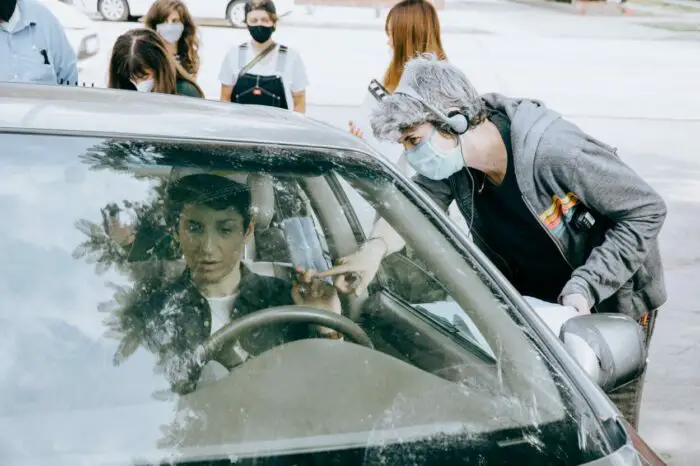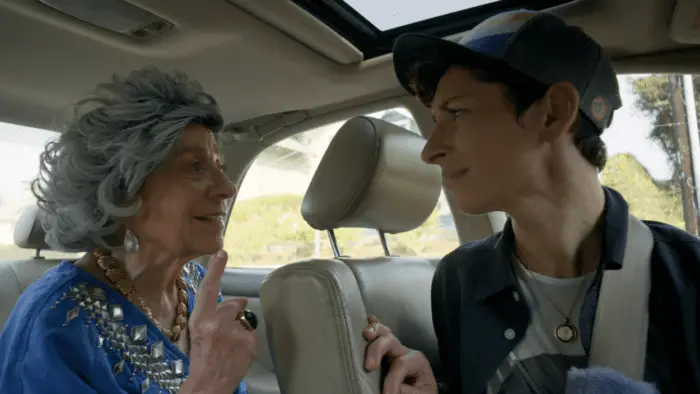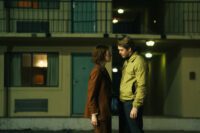With her short film “Grandma Bruce,” writer-director Brooke Sebold has crafted both a clever comedy and a touching tribute to her own grandmother. When her grandmother passed, Sebold drove her old Lexus sedan, which she nicknamed “Grandma Bruce.” For over a decade, all the long while imagining herself in a continuous backseat commentary. Work, life, love, fashion, driving skills, you name it—imaginary Grandma had a lot to say.
Those imaginary conversations formed the core of “Grandma Bruce,” which stars Laura Chirinos as the filmmaker and Monica Piper as her grandmother. The film has played at Wicked Queer in Boston, the Poppy Jasper International Film Festival, Oxford Film Festival, the Santa Barbara Jewish Film Festival, and the San Jose International Short Film Festival. Sebold calls her film “a love letter to my Grandma,” but it is also a smart comment on intergenerational change. Would her grandmother—any of her generation’s grandmothers—have imagined their grandchildren to become genderqueer trucker-hat-wearing indie filmmakers charting their own paths so freely and fiercely?
Brooke Sebold is a filmmaker and editor whose work has won jury and audience awards internationally. Her first feature documentary, Red Without Blue, won the Audience Award at Slamdance and the Jury Award at Frameline; her feature documentary Framing Agnes was named a Best Movie of the Year by The New Yorker after premiering at the Sundance Film Festival. Her narrative shorts have also won awards at Palm Springs ShortsFest and the Florida Film Festival. Sebold also serves as the editor of the Emmy-nominated series, Brief But Spectacular, which airs weekly on PBS NewsHour.
Sebold recently spoke with Film Obsessive’s J Paul Johnson on the production of “Grandma Bruce” and her upcoming project, the nonfiction series, I Changed My Mind. The transcript following the video below has been edited for space and clarity.
Film Obsessive: Brooke, let me leave it to you to explain the title, Grandma Bruce and tell us a little bit about your short film.
Brooke Sebold: Well, I’ll say that “Grandma Bruce” is a bit of a love letter to my grandma, who I was very close to. She passed away in 2001, and I had been driving her hand-me-down Lexus sedan for about a decade. And the film is really about saying goodbye to my grandma and also the car that we once shared. It’s a magical short comedy, and so the car comes to life with the spirit of my grandma, from the ever after, who is a bit of a backseat driver and has judgmental opinions about the character’s life and also their driving.
So it’s a comedy. And it really was a tribute to my grandma—she and I had a really special relationship—and also to the generational divide as such, and also the sort of cultural stories and expectations around what one’s life is supposed to look like. And so the film is sort of in a very loving way, challenging back and, you know, kind of claiming one’s own choices and releasing oneself from those cultural expectations in a funny, charming way, hopefully.

That is lovely. And it is funny, and it is charming. And we do get to laugh a lot along the way. What would you tell me about your grandma that you really wanted to convey in this film?
I think the biggest thing is just how much love we both have for each other. And then also, I think I don’t know if it’s an epigenetic Jewish cultural thing to use humor and especially complain through humor. And so I think it’s just that, like, push and pull of, you know, the love that we have for each other and also this very specific cultural language of judgmental worry, which I feel like was a big part of my grandmother’s love language to me and also to all of her grandkids and family. It was just like, in some ways, how she shows love.
So in a loving way, it’s sort of looking at that and also wanting to celebrate that because I continue to feel like that’s very familiar, and it comes from a loving place, and also to recognize some of the programming behind those suggestions of how your life is supposed to look like.
Right. And you’re carving out a different life for yourself as a filmmaker, I think, than maybe your grandmother would have expected or wanted. And the film is really about your character—she’s a stand in for you, right, is it fair to say that?—making her own choices and finding the courage to stand up for those choices and express them, even if they’re not exactly what grandma would have thought for herself.
Yeah. She was supportive in her own ways, and she understood my life as well as she could, but it was fun in making this film to kind of be able to articulate things that I didn’t know about myself to articulate to her at the time. At the time I was, I don’t even think the word non-binary existed when my grandmother passed away. So there are things that I’ve learned about myself since she’s been gone, and it was fun to make this film and to be able to articulate some of those nuances.
And then, I’m not an actor at all, and when I first wrote this, it was the beginning of the pandemic. And it was supposed to be a very small scale thing, made on a shoestring budget. I had originally thought I would just be in it. I thought it would just be sort of like a fun exercise in doing something bold and new. And then the further I got along in the process, I was like, I’m writing, I’m directing, driving and acting. It’s too much. It’s too much.

So then I started casting and immediately found the actor who plays Brooke, Laura Chirinos, and she’s just so wonderful, and she had a lot of similarities in her own life that I think she really connected to the story. But then also, now I know Laura after having shot the film, and, you know, she brings so much of herself to it. She’s also so different from the character she plays. And so it was really interesting for me to just sort of see her make it her own with her own personal history and also bring so much of me. She sort of watched me and took from that and brought that into the character. So it was so fun to see and also much more fun to edit and be out in the world with it when it’s not my face!
I hear that! And I did want to ask you a little bit about that timeline. So this is a film that you did start pre-COVID or during COVID. And then, were you in production during COVID?
Yeah, I started writing it probably about six or seven months into the COVID experience. And then we probably shot it maybe like nine or ten months later and then, you know, let it sit for a bit, came back to it. It’s sort of been this loving passion project. And then we finally did a little reshooting and finished it up last year.
Got you. And I agree, Laura Chirinos is really excellent in the film. I have no indication of what your acting abilities might be or might not be, but I respect that the choice really worked out! And I have talked to directors who have acted in their films and have said it is more difficult sometimes than they anticipated. And it’s a nice thing to be able to get off their plate even in a small production like yours.
But I also have to give a compliment to Monica Piper, who is so excellent as the Grandma character here. And It seems to me, she also seems even to facially slightly resemble Laura Chirinos. I mean, at least to the extent that they seem very plausibly like they could be from the same gene pool.
Yeah, totally, totally. And Monica is so great. She was just we got connected to someone who was connected to the Braid Theater, which was used to be known as the Jewish National Theater. We got connected to a handful of different potential actors to play the role of Grandma. And Monica was just so funny. We aged her up many years. She is not as old as the Grandma character. But she also, you know, she was a writer for the original Roseanne series, and she was the head writer for Rugrats. And she’s a comedian, and the most fun part of the entire process for me was once I had the script, and I had it cast, and then I had them here in my living room, and we were playing and ad libbing and adding lines and punching it up, and it was just so fun having that sort of creative energy. And both of those actors also are just incredibly supportive and, you know, real collaborators. So it was wonderful to make a film with that kind of energy.
And she [Monica Piper] is funny. And the film is funny, too. And I think a lot of times that people can be funny, but that doesn’t necessarily mean a film is going to be funny. The really nice work, I think, is on the timing of the film. A lot of that comes out of the editing and managing the reaction shots, as what you’re doing in the car is something different from what viewers experience when they see it on the screen months later. So I have to give your editing a compliment there.
That’s always the hardest thing in a piece like this is the film is very true to the script, but we definitely cut out a bunch of lines here and there to sort of punch it up. And so and I edited this with my friend, Steph Kaznocha, who’s a wonderful editor. But so much of it is really just taking off like six frames here, and all of a sudden, the joke lands. And so it really takes a while to get it there and, like, lots of feedback from lots of different people, which, as an editor myself, that is such a fun part of the process, because it’s really like you get to see just the magic of the minutiae and changing or moving a sound effect or something, and it really sort of like changes the texture and nature of a scene.

But you are a documentary filmmaker—is that what you consider yourself primarily?—and this is, a different kind of work than you usually do, right?
Well, it’s hard to even say what I usually do because I came into film as an undergrad, I studied film, I went to Brown where it was like experimental film and theory, and I fell in love with that, and I would shoot Super 8 film and hand process it and tape dirt and dust onto film and project it, and it was great and I loved it. And then I moved to San Francisco and I discovered documentary. And that’s when I co directed my first documentary feature, and that was a four-year process. And really fell in love with documentary film in San Francisco, it was like a little bit like, the Hollywood of documentary. It’s what everyone was doing. And so I got very immersed in it.
And then my passion had always been narrative film. And so I went back to film school and studied writing and directing and graduated and came out here. That was, like, ten years ago. And so, really, I mean, I love narrative so much. I don’t have an opportunity to do it so frequently because it’s extremely expensive. With documentary, there is something really wonderful about, like, the agency of being able to kind of pick up a camera and start shooting and start making. And so just generally, I have made more documentary work. I also edit a ton of documentary work and features for TV.
And so, in some ways, my life has weighted more heavily to documentary, but it’s not really true. It’s like so much of the narrative scripted work is invisible in the sense of, like, pitching series or trying to get funding for a feature that falls through or whatever it is. And so they’re really both neck and neck. I love them both, and they’re so different. You know, it’s like, I really appreciate the ability of just sort of like feeling what a story is and what would serve it. And it’s like, Oh, is that a documentary or is that something that, you know, could be different in a scripted form if you can manipulate the elements of the story in a different way. And, you know, each has different strengths, and its just different process. So I love them both a lot.
I hear that. And there are many fascinating ways these days that they can intersect or converge or inform each other without necessarily being or feeling separate from each other.
In terms of my editing work, I actually have done a couple of features that are sort of in a hybrid space of, like, either either like elevated reenactments or whatever it might be, but it’s really sort of a fusion of doc and narrative. And those are honestly my favorite projects because they’re also experimental. So it’s like it hits all the bases.
Exciting. I was going to mention the last interview I did with Laura Plancarte, who just directed Mexican Dream, which is very much in that same vein. It started as documentary about a Mexican woman in kind of a midlife crisis. Plancarte mailed her an iPhone, said film yourself, got to the end of that process, and the two of them decided together, well, let’s just cast that footage aside and just script this and do the whole film as a reenactment. And it was marvelous, just, fascinating.
There’s so many different ways that filmmakers can work without feeling constrained and bound by labels. The challenge for all of them is then making their work clear as they’re submitting it to festivals, trying to get it licensed, trying to get it out in the world because that world tends to depend more on labels. Speaking of which, I just wanted to ask you about your plans for “Grandma Bruce” and where it’s been in festivals so far and what you have lined up for it next.
Yeah, it’s played at a bunch of festivals. We premiered at the San Jose Short Film Festival, which was wonderful. And then it played at a festival in San Francisco, one here in LA, and we’re submitting it, and it’s playing, you know, in a handful of different queer festivals. I played in the Boston Wicked Film Queer Film Festival, and, you know, hopefully it will continue to live a long life of festivals. We’ll see. And ideally, I’m looking now to figure out a platform where I can distribute it so that it can be seen a little bit more widely.
And then my intention is just to keep writing and keep making work. I just wrote another short a couple of weeks ago. So I was going to say I love film so much. I love documentary, I love narrative and scripted. In some ways. It’s hard because it’s so hard to get all of the pieces together to keep making. So I wish I loved it a little bit less sometimes, and yet I can’t help myself because I want to keep making films!
And you have a series that you’re working on too, called I Changed My Mind. Where’s that?
Yes. We’re actually releasing the pilot episode in June, a little bit, yeah, about a month from now for Pride Month. The series is called, I Changed My Mind, and it’s an interview series. Each episode is with a guest who has changed their mind about something significant in their lives that led to a paradigm shift. And the concept of the show is to sort of normalize what changing your mind looks like because we live in such a crazy, polarized time that it’s helpful for us to remember that we have a flexibility mindset and can change our minds about things.
And so the first episode is with a woman named Jane, who is a formerly transphobic mom who changed her mind and chose to love and accept her trans teenage son after he attempted suicide. So that’s the first episode. And we shot three episodes that were funded by a grant through UC Berkeley, Greater Good Science Center, and we’re going to be releasing those throughout the year and then hopefully continue to get funding and continue to make more episodes. It’s a project that’s really special. The three episodes that we’ve made so far, I’m thrilled about, really excited to share. And I just hope we get to make more.
Good on you, Brooke. That sounds fantastic. Do you know when and where we will be able to see those?
Yes. So, you know, my collaborator on that project is a production company called Second Peninsula, and the series that I’ve been working on with them for about four years now is a series called Brief but Spectacular, which is a little profile series, also an interview show where each episode is a guest it’s basically spectacular people in the world doing spectacular things, and it airs every week on PBS News Hour, and it’s like solutions journalism, like, focusing on the people who are trying to make a difference in the world.
So we’re going to be releasing it on our YouTube Brief but Spectacular channel. And then we’re going to be collaborating with PFLAG and just pushing it out on social media platforms and hopefully the people who need to see it will have an opportunity to see it, because Jana specifically, her story is just so special.
It sounds touching and I’m sure it will be. I look forward to watching it myself. I’ll encourage our viewers and readers to look for it. And I’ll just say thank you so much for joining us to talk about “Grandma Bruce” and I Changed My Mind and all of your other great work, Brooke.
Thank you so much. This was really a pleasure. I really appreciate it.




